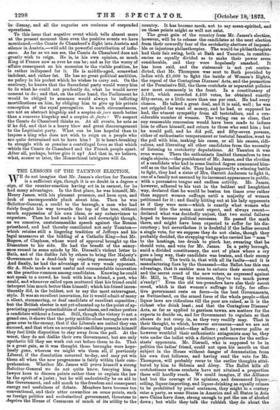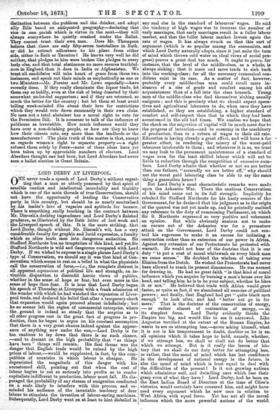THE LESSONS OF THE TAUNTON ELECTION.
WEdo not imagine that Mr. James's election for Taunton is a sufficient sign, though it is no doubt in a degree a sign, of the counter-reaction having set in in earnest, for he had many advantages. In the first place, he was himself, Mr. Henry James, with his pleasant presence, and keen eyes, and look of unconquerable pluck about him. Then he was Solicitor-General, a credit to the borough, a man who had fairly fought his way towards the top of the tree, without much suppression of his own ideas, or any subservience to superiors. Then he had made a bold and downright though, as we conceive, unstatesmanlike speech against the Roman priesthood, and had thereby conciliated not only Taunton— which retains still a lingering tradition of Jeffreys and his legal massacres at the bidding of a Catholic King—but Mr. Rogers, of Clapham, whose word of approval brought up the Dissenters to his side. He had the benefit of the annoy- ance roused in some minds by Mr. Disraeli's violent letter to Bath, and of the dislike felt by others to bring Her Majesty's • -Government to a dead-lock by rejecting necessary officials. And finally, he had the advantage of a very weak opponent. Sir A. Slade made a most useful and commendable innovation on the practice common among candidates. Knowing he could not speak to a crowd, he took with him a friend, a poet, who could, and whenever called upon muttered that his friend could interpret him much better than himself; which his friend incon- tinently did, in the boldest, not to say the most extravagant, style. It was an excellent innovation, for it would admit of many • a silent, stammering, or deaf candidate of excellent capacities ; but the British elector is not yet educated up to the point of ap- preciating possible potentialities of usefulness, and rather prefers -a candidate without a funnel. Still, though the victory is not a grand one, it shows that the petty middle-class boroughs are not gone over to the enemy, that if the Liberals are united they can succeed, and that when an acceptable candidate presents himself they feel little disposition to stay away from the poll. At the worst, they do not dislike their own Government, but are only apathetic till they see work cut out before them to do. That is a great gain, as it was thought these boroughs were hope- lessly gone, whereas we might win them all, if previously Liberal, if the dissolution occurred to-day, and may yet win them all when the new programme is fairly withia their com- prehension. Whether Mr. James will prove himself a strong Solicitor -General we do not quite know, fancying him a lawyer keen to discern points rather than to explain the law in the spirit of a jurist ; but he will undoubtedly be an aid to the Government, and add much to the freedom and consequent energy and usefulness of debate. Members have become too -conventional, and their utter cowardice on some points, such as foreign politics and ecclesiastical government, threatens to deprive the House of Commons of much of its utility to the
country. It has become meek, not to say mean-spirited, and on those points might as well not exist.
The great gain of the country from Mr. James's election, however, will be to release the candidates at the next election from their cowardly fear of the crotchetty abettors of impossi- ble or injurious philanthropies. The would-be philanthropists had their fair swing, both at Bath and Taunton, in constitu- encies so equally divided as to make their power seem considerable, and they were hopelessly smashed. It has been said, and the statement is not yet contra- dicted, that Mr. Thompson was sent to Bath provided by ladies with £1,000 to fight the battle of Women's Rights, the repeal of the Contagious Diseases' Acts, and the promotion of the Permissive Bill, the three crotchets or separatist policies now most commonly in the front. In a constituency of 5,189, which recorded 4,400 votes, he obtained exactly fifty-seven, or a little more than one per cent. He had every chance. He talked a great deal, and it is said, well ; he was not crippled for want of money, and he had, or supposed he had, the utmost sympathy from all teetotallers, and a con- siderable number of women. The voting ran so close, that any reasonable concession would have been made to induce him to efface himself, and return to those who sent him ; but he would poll, and he did poll, and fifty-seven persons, either of enthusiastic temperament or teetotal fanatics, went to the poll with him, making his cause, or all his causes, ridi- culous, and liberating all other candidates from the necessity of listening to crotchetty deputations. At Taunton it was even worse. There the enthusiasts limited themselves to two single objects,—the punishment of Mr. James, and the election of a candidate who had in some limited degree announced him- self as on the ladies' side. They had apparently a winning battle to fight, they had a sister of Mrs. Garrett Anderson to fight it, one of a family not unsexed by its incessant appearance in public, with a persuasive tongue and endless activity. Mr. James, however, adhered to his text in the boldest and haughtiest way, declared that he would be beaten ten times over rather than support woman suffrage until a majority of women petitioned for it ; and finally hitting out at his lady opponents as if they were men—which is exactly what women who descend into the arena must expect, and always resent— declared what was decidedly unjust, that two social failures hoped to become political successes. He passed the mark there, and might have been expected to suffer for his dis- courtesy ; but nevertheless it is doubtful if the ladies secured a single vote, for we suppose they do not claim, though they probably decided, the strapping virago who carried her " man " to the hustings, too drunk to pinch her, swearing that he should vote, and vote for Mr. James. In a petty borough, amid a divided constituency, the sort of place where a cry goes a long way, their candidate was beaten, and their enemy triumphed. The truth is, that with all its faults—and it is manufacturing liars by the thousand—the Ballot has this one advantage, that it enables men to enforce their secret creed, and the secret creed of the new voters, as expressed against Mr. Mill, is, "Hang the missuses, they've too much power a'readyl " Even the old ten-pounders have also their secret creed, which is that women's suffrage is folly, for effec- tive government rests on force—in the best Governments, as Switzerland, on the armed force of the whole people—that liquor laws are ridiculous till the poor are raised, as it is the richest who drink least ; and that the Contagious Diseases' Acts, so far as applied to garrison towns, are matters for the experts to decide on, and for Government to regulate so that abuses do not creep in, as they very readily may. That is their thought, to which, however erroneous—and we are not discussing that point—they adhere ; and however polite or however wrathful their enthusiastic antagonists may be, they vote under the ballot with a distinct preference for the enthu- siasts' opponents. Mr. Disraeli, who is supposed to be in politics the ladies' friend, could not open his mouth on that subject in the House without danger of denunciation from his own first follower, and having read the vote for Mr. Thompson, will probably recur to the earlier thoughts attri- buted by him to Sidonia and Alroy. The Ballot kills all crotchetteers whose crochets have not attained a proportion these will hardly reach. We could imagine, if the Alliance had but the courage of its opinions, and denounced liquor- selling, liquor-importing, and liquor-drinking as equally crimes to be prohibited by penal sentences, they might in a century raise a party, as some States in America and all States in Asia save China have done, strong enough to put the use of alcohol down ; but while they talk the rubbish they do about the -distinction between the publican and the drinker, and adopt silly Bills based on antiquated geography—declaring that vice in one pariah which is virtue in the next—they will always everywhere be quietly crushed under the Ballot. They cannot trust their own men. Does Mr. Thompson believe that there are only fifty-seven teetotallers in Bath, or did he extract adherence to his plans from either side, either in Bath or Taunton ? He knows very well he did neither, that pledges to him were broken like pledges to every body else, and that total abstinence no more secures truthful- ness in England than it does in India or Afghanistan. We trust all candidates will take heart of grace from these two instances, and speak out their minds as emphatically as one or two Ministers—Mr. Forster and Mr. Lowe especially—have recently done. If they really abominate the liquor trade, let them say so boldly, even at the risk of being deserted by their somewhat under-fed supporters ; and if they are returned, so much the better for the country ; but let them at least avoid telling weak-minded fibs about their love for restrictions which they would vote down summarily in their own clubs. No man not a total abstainer has a moral right to vote for the Permissive Bill. It is nonsense to talk of the influence of publicans as irresistible. How much influence would they have over a non-drinking people, or how are they to know how their clients vote, any more than the landlords or the manufacturers ? The plain truth of the matter is that, except as regards women's right to separate property — a right refused them solely by Peers—none of these ideas have yet been taken up by appreciable numbers of electors. Lord Aberdare thought one had been, but Lord Aberdare had never seen a ballot election in Great Britain.



































 Previous page
Previous page